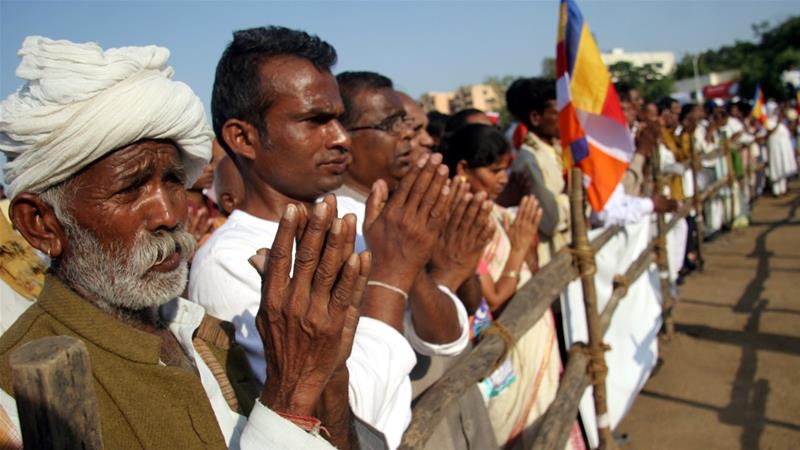 Image for representation purpose only
Image for representation purpose only
Recently, Davangere taluk in Puttaganal village in Karnataka has reported incidents of dead bodies belonging to those from oppressed classes being buried by the side of the road, said The New Indian Express.
It was reported that people passing by Kadajji village could see several burial sites adjacent to the roads, along with temporary shelters made using coconut leaves. This is happening because the oppressed classes from this village have not been allowed to bury their dead in graveyards belonging to other communities. Speaking to the publication, the villagers said that while they used to bury those who passed away in a nearby field, that option too was snatched from them after someone took over the field and fenced it leaving only the roadside a place to be used as a burial ground.
The burials are scaring the public, with several thinking twice before using the roads where the deceased are buried. The same is also affecting the health of the people there.
Putaganal is one of 91 villages where the work of setting up public cemeteries using the asset creation project under the Centre’s Mahatma Gandhi National Rural Employment Generation Act (MGNREGA) where the entire cost of the leveling, fencing and fixing of the board to the cemeteries is done using the fund from the programme. However, this work of setting up public cemeteries is still pending because no government land is present in the 91 villages and villagers are not interested to give up their private land.
Saying that the issue will be taken up with the respective Gram Panchayat, Zilla Parishad CEO Padma Basavanthappa told The New Indian Express, “About 91 villages in the district have no public cemeteries for burial, hence, we have not set up cemeteries in these places and we will initiate setting up public burial grounds across the district in the coming days.” She also said that the problem of villagers not coming forward to hand over their lands for setting up cemeteries will be taken up with the district administration.
The same publication had earlier in the year reported that the Dalits of Vadachinnaripalayam village in the Tirupur district were using roadside spaces to bury the departed. At the time, Raja, one of the villagers had filed a petition with the Collector saying that around 50 Dalit families in the village, mostly Christians, were denied burial grounds by people from dominant communities and subjected to oppression.
In Maharashtra too, the publication DNA reported in 2011 that the Maharashtra Ministry for social justice that Dalit burial grounds have been usurped by upper castes in with 72.13% of the state’s 43,722 villages. It reported the despicable incident from November 22, 2008 when upper caste men led by priests of the local Khandoba temple, Sanjay and Ganptrao Naik, attacked a funeral procession of a Dalit man with sticks and swords because they were taking a dead body to the designated crematorium and the man had to be buried by the roadside later.
Even in Punjab, DNA reported how Dalits who make up 30 percent of the population are forced to live in thhattis on the western side of the state so that the winds blowing over them don’t pollute the upper castes. Not only are they not to bury their dead in the main cremation grounds, but are also forced to make separate gurudwaras for worship.
In Kerala too, the problem was documented by Sanu Kummil, a journalist, who made a documentary titled Six Feet Under on the subject, The News Minute reported in 2019. Sanu said that the lack of space in public graveyards forced people to bury the dead on their own land, and those who didn’t have enough land, had to demolish their own homes to bury their dead kin. He recorded the story of Girija who had to bury her daughters, Saji who had to bury his aunt who was laid at rest in her own kitchen and Lekha, whose uncle committed suicide and whose body was burnt along with the house he stayed in.
No reports, no protests
Social activist Sunny Kapikad speaking to TNM said, “Their life and situation are so bad that they are not even aware this is a problem. They bury their dead in the kitchen and carry on with their lives again. They don’t even protest, because they are not aware it is a problem. And that’s because the society is least concerned about it. The fact that there is no place to bury the dead is being normalised.”
The problem also is segregation, he said. He said that according to government data, there were 29,000 Dalit colonies and 4,500 Adivasi colonies which became a tool to discriminate on the basis of caste. Also, it wasn’t just a simple upper caste and lower caste issue.
Most of the land that could be used for the construction of a public burial ground was usurped by corporates and the government illegally. While Article 17 of the Constitution abolishes all forms of untouchability, the reality is far from it. There are hundreds of villages and hamlets, not only in Maharashtra and Kerala, but all over the country where the backward classes face oppression and are excluded from the right of a dignified burial for the dead.
Even if there are burial grounds demarcated for the backward classes, they are not allowed to bury the deceased there. With more than half of the lower caste population being landless, the Dalits and people from other backward classes have had to pursue a long standing fight to even live a decent life and attain a decent livelihood.
Now with lands not being allocated to them and if allocated, the lands being usurped, along with caste discrimination, the oppressed backward classes have to fight a two-pronged battle for dignity.
For people who hardly find dignity in life, will they ever find dignity in death given the problems they face?
Related:
